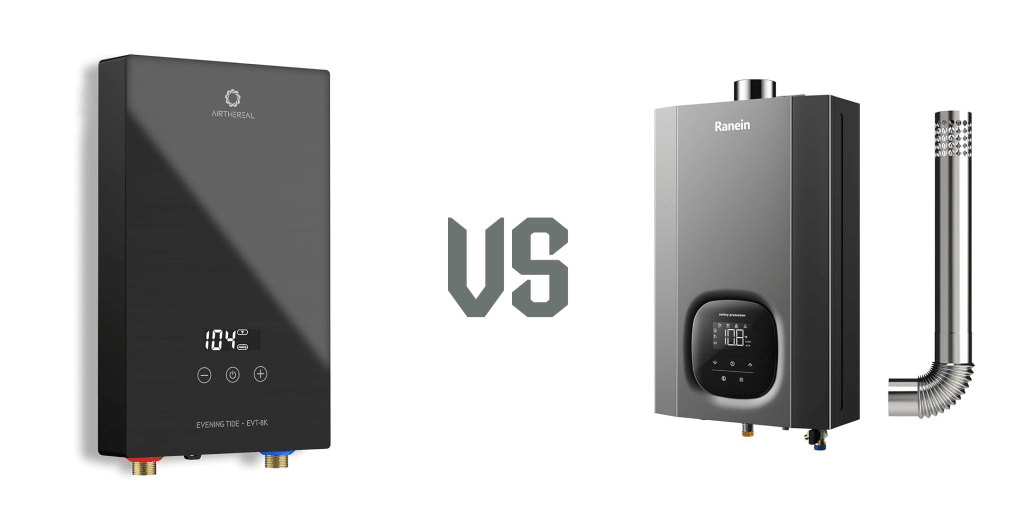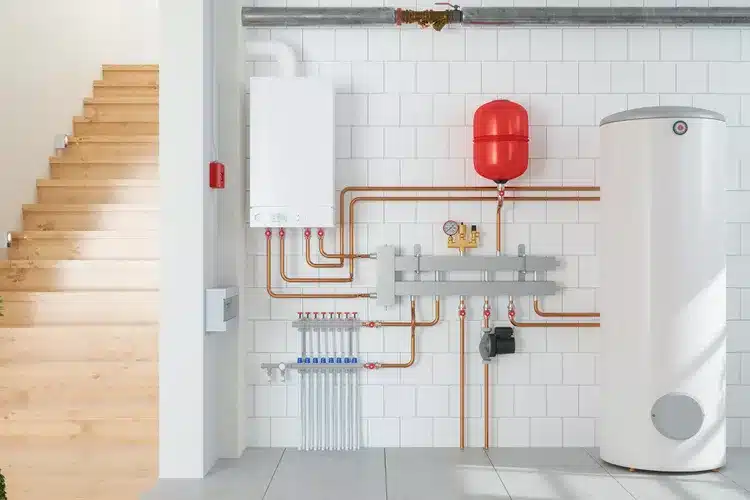Comparing the Tankless Gas Water Heater vs Electric

Is your old water heater on its last legs? You’re not alone. Many homeowners face the tough choice between a tankless gas water heater vs electric. It’s like picking between a sports car and an SUV – both have perks, but which fits your lifestyle?
The first question arises: is a tankless water heater gas or electric? A tankless water heater can be either gas or electric:
- Gas Tankless Water Heaters: Use natural gas or propane and offer higher flow rates and efficiency for larger households. They require venting and gas line installation.
- Electric Tankless Water Heaters: Operate on electricity and are easier to install, with no venting needed. They are ideal for smaller homes but may have higher operating costs.
The choice depends on your hot water needs and energy availability.
Here’s a fun fact: tankless water heaters can slash your energy bills by up to 34% compared to traditional models. That’s some serious savings! This article will discuss the key differences between electric and gas tankless water heaters.
We’ll cover everything from installation costs to long-term savings. By the end, you’ll be a pro at choosing the right tankless water heater for your home. Ready to heat things up?
Key Differences Between the Tankless Gas Water Heater vs Electric
Electric vs gas tankless water heaters work differently. They use separate energy sources and have unique heating abilities.
Energy source and operation
Tankless water heaters come in two main types: electric and gas. Electric models use heating elements to warm water as it flows through the unit. They plug into your home’s electrical system and heat water on demand.
On the other hand, gas heaters burn natural gas or propane to heat water quickly. They need a fuel source and proper venting for safe operation.
Both types have their strengths. Electric heaters produce about 2 gallons of hot water per minute with a 70-degree temperature rise. Gas models often deliver more consistent hot water, making them better for high-demand homes.
Your choice depends on your home’s setup and hot water needs. When choosing a tankless water heater electric vs gas, consider factors like available energy sources, installation costs, and long-term operating expenses.
Heating capacity
Gas tankless water heaters offer significant heating capacity. They can produce 5 to 10+ gallons of hot water per minute, sufficient for running multiple showers and appliances simultaneously.
Electric models provide 2 to 5 gallons per minute, making them more suitable for smaller homes or those with lower hot water demands.
Climate significantly influences the performance of these heaters. Gas units maintain heat output even with very cold incoming water, while electric models may face challenges in colder weather.
A gas heater might be the optimal choice for those living in areas with cold temperatures. In warmer regions, both types can perform adequately. The crucial factor is selecting a heater with a capacity that matches your home’s requirements and local climate conditions.
Installation Process and Costs
Getting a tankless water heater set up can be tricky. You’ll need to think about costs for both parts and labor.
Electric tankless water heater installation
Electric tankless water heaters are easy to install. They’re compact and don’t need venting, making them perfect for tight spaces. However, you’ll need a pro to set up the electrical system.
These units require significant power, needing 200 AMP and 208 to 240 volts to run smoothly. That’s a considerable amount of electricity!
The cost of installing an electric tankless heater ranges from $1,800 to $7,200. This price includes both the unit and labor. While it might seem steep, it’s often cheaper than gas options.
Gas lines and exhaust systems will not be a concern. Before you proceed with the installation, make sure your home’s wiring can handle the load.
Gas tankless water heater installation
Gas tankless water heaters require professional installation. They cost more upfront due to special venting and gas line needs. You’ll pay $3,000 to $8,500 for everything, including installation.
The process involves checking your home’s gas supply and venting correctly. This isn’t a DIY job, folks. You’ll need a pro to make sure everything’s safe and up to code.
Pros will evaluate your home’s current setup, including gas lines, venting, and where to place the unit. The installation might require upgrades to your gas meter or line, as venting is crucial for these heaters.
It safely removes combustion gases from your home. The installer will also hook up water lines and test the system. It’s a big job but pays off in endless hot water and energy savings.

Efficiency and Operating Costs
Efficiency and operating costs are key factors when choosing a tankless water heater. Electric models often boast higher efficiency ratings, but gas units may cost less to run in some areas.
Your choice depends on local energy prices and your home’s setup.
Efficiency of electric vs. gas water heaters
Electric and gas tankless water heaters differ in their efficiency. Let’s compare them side by side:
| Electric Tankless Water Heaters | Gas Tankless Water Heaters |
| Efficiency over 98% | Efficiency between 80-85% |
| UEF rating of .96 or higher | UEF rating between .81 and .96 |
| More energy-efficient than traditional models | Less efficient than electric counterparts |
| Lower energy loss during operation | Some energy loss due to combustion process |
| Consistent performance in various climates | May have reduced efficiency in colder regions |
Electric tankless water heaters win the efficiency race. They convert almost all input energy into heat. Gas models lag due to energy loss during combustion. Your choice might depend on local energy costs and availability.
Long-term operating costs comparison
Long-term operating costs play a big role in choosing between electric and gas tankless water heaters. Let’s break down the numbers to see which option might save you more money over time.
| Cost Factor | Electric Tankless | Gas Tankless |
| Annual Operating Cost | $535 | $195 |
| Savings vs. Storage Tank | $45 per year | $50 per year |
| Payback Period | 12-20 years | 22.5-27.5 years |
Gas tankless units cost less to run each year, saving about $340 compared to electric models. Both types cut energy waste by ditching the storage tank, leading to at least $100 in yearly utility bill savings. Electric units have a faster payback time, but gas units offer bigger long-term savings. Your choice depends on local energy prices and how long you’ll stay in your home.
Maintenance Requirements
Keeping your tankless water heater in top shape is key. Both electric and gas models need regular check-ups, but their needs differ.
Maintenance of electric heaters
Electric tankless water heaters are a breeze to maintain. Their simple design means fewer parts to worry about. Most owners only need to clean the inlet screen and check connections once a year.
This quick task helps prevent mineral buildup and keeps the unit running smoothly. Unlike gas models, electric heaters don’t need yearly professional checkups, which saves time and money in the long run.
For best results, flush your electric tankless heater every few years. This process removes any scale that might have formed inside. You can do this yourself or hire a pro if you’re not handy.
Some units have self-cleaning features, making upkeep even easier. With proper care, an electric tankless water heater can last 20 years or more—longer than most traditional tank models.
Maintenance of gas heaters
Gas tankless water heaters need regular upkeep to stay safe and work well. You’ll want to check them every year, which means inspecting the gas parts and cleaning out the heat exchanger.
It’s smart to get a pro to do this job. They know how to spot issues that could cause trouble later.
These heaters can be tricky because they burn fuel inside your home. You need to make sure the venting system is in good shape, as this keeps harmful gases from building up in your house.
Also, the air supply for burning must be clear. The heater won’t work right without enough air and could be dangerous.
Final Thoughts
Choosing between a tankless gas water heater vs electric depends on your home’s needs. Electric models excel in smaller homes with less demand, while gas units excel in larger households.
Your budget, energy costs, and local regulations play key roles, too. Both options offer energy savings over traditional tanks. Weigh the pros and cons carefully to find the perfect fit for your home.
Please review our choices for the best electric hot water heater or the best tankless water heater gas so you can make the right decision.
Your wallet and the planet will thank you for making a smart choice.
FAQs
1. What’s the main difference between gas vs electric tankless water heaters?
Electric tankless heaters use electric current to heat water, while gas-fired units burn natural gas or propane. Gas models often heat water faster but need proper ventilation. Electric ones are simpler to install but may require upgraded wiring.
2. How do tankless water heaters compare to regular tank-type models in energy efficiency?
Tankless, electric, and gas units typically outperform storage water heaters in terms of energy efficiency. They heat water on demand, cutting energy waste. However, the savings depend on your water use and local utility rates.
3. Are gas vs electric tankless water heaters cheaper to run?
It’s not a one-size-fits-all answer. Your wallet feels the pinch based on local gas and electricity prices. Gas models often cost less to operate in areas with cheap natural gas. But where electricity is a bargain, electric units might be your best bet. The choice of electric tankless water heater vs gas is specific to each home.
4. Do tankless water heaters need special plumbing or ventilation?
Gas tankless heaters usually need special venting and a steady combustion air supply. Electric models don’t need venting but might require beefed-up electrical systems. Both types may need tweaks to your existing plumbing setup.
5. Which type is better for reducing greenhouse gas emissions?
Electric tankless water heaters often have a leg up here, especially if your electricity comes from clean sources like wind or hydroelectric generators. Gas models, while efficient, still burn fossil fuels and release greenhouse gases.
6. Are there any tax credits or incentives for choosing tankless water heaters?
You bet! Many areas offer incentives for energy-efficient appliances. Federal tax credits sometimes apply to high-efficiency gas and electric tankless models. Check with your local utility company or a tax pro for the latest scoop on available perks.


